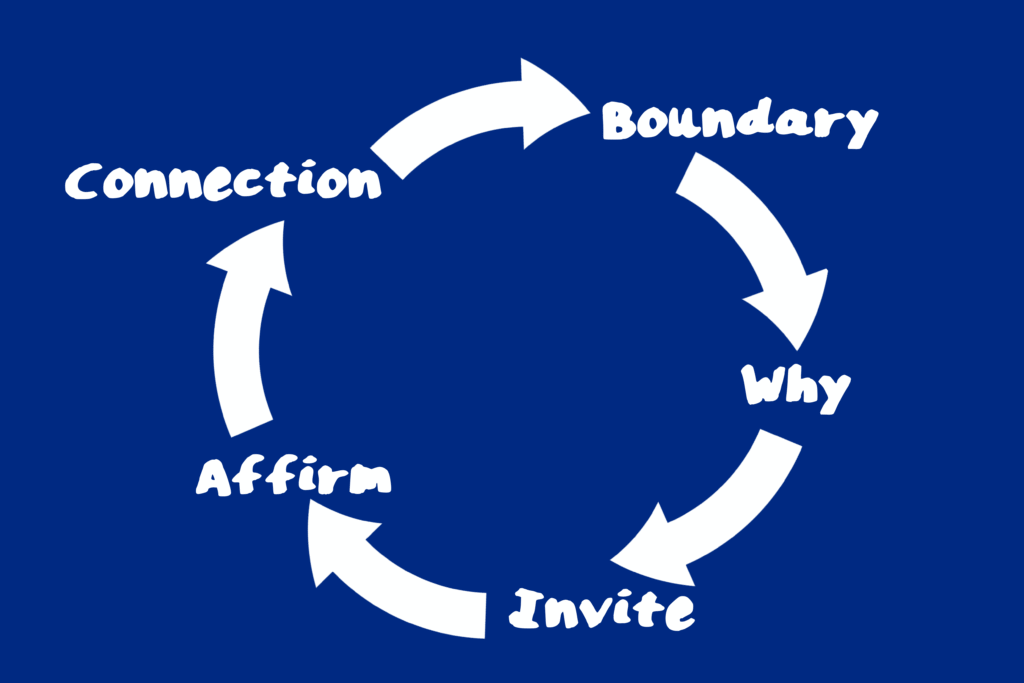The Conversation Kit: Scripts for Respectful Boundary Talks with Grandparents

Awkward doesn’t have to mean adversarial. If you’ve avoided “the talk” because you fear hurting feelings, borrow our word-for-word scripts for the thorniest moments: faith differences, dating limits, sugar/screens overload, and “but that’s how we did it.” You’ll get language that honors their love, clarifies your non-negotiables, and invites partnership. Say less, say it clearly, and leave space for dignity on both sides.
Why Every Family Needs a Conversation Kit
 It’s one thing to set boundaries—it’s another to talk about them without bruising hearts.
It’s one thing to set boundaries—it’s another to talk about them without bruising hearts.
Most couples freeze when the conversation turns emotional. They either go silent (“It’s not worth the fight”) or over-explain until it becomes a lecture. Both leave everyone exhausted.
The Conversation Kit gives you what you need most: language that carries both truth and love.
Boundaries fail not because they’re wrong, but because they’re badly delivered.
When grandparents hear correction, they often translate it as rejection: “You think I’m a bad influence” or “You don’t trust me.” But when they hear love first, they stay in the room long enough to understand your heart.
The goal isn’t to win; it’s to preserve connection while staying firm on what matters.
If you haven’t already grounded your boundary mindset, start by reviewing Whose Rules Win? Re-Centering Parental Authority. That post helps you define the “why” behind your rules so this Conversation Kit feels natural, not scripted.
The Anatomy of a Respectful Boundary Conversation
 Every conversation about boundaries follows a predictable curve. Once you learn the rhythm, it’s easier to stay grounded even when emotions spike.
Every conversation about boundaries follows a predictable curve. Once you learn the rhythm, it’s easier to stay grounded even when emotions spike.
Step 1: Begin with Connection
Start with gratitude or shared love: “You’ve always been such a big part of our family.”
This disarms defensiveness and reminds everyone you’re on the same team.
Step 2: State the Boundary Calmly
Avoid over-explaining. One sentence beats ten.
“Because we’re the parents, we’re choosing one dessert so the kids learn moderation.”
Step 3: Explain the Why
A short reason keeps the rule from sounding arbitrary.
“This helps them sleep well and handle school the next day.”
Step 4: Invite Participation
“We’d love your help keeping it consistent.”
Step 5: Affirm Relationship
End with hope: “You’re so important to them, and we want this to be easy for everyone.”
That’s the heart of a respectful boundary talk—grace, clarity, invitation, affirmation.
Script 1: The Faith Difference Conversation
 Faith is often where boundaries feel most personal. If your parents or in-laws have drifted from your beliefs—or adopted new ones—the tension can rise fast.
Faith is often where boundaries feel most personal. If your parents or in-laws have drifted from your beliefs—or adopted new ones—the tension can rise fast.
The key is not to debate theology but to reaffirm parental authority over spiritual formation.
Try this:
“We’re so grateful that faith has always mattered in our family. Because we’re the parents, we’re choosing to raise the kids in our church and to keep Sunday mornings consistent. We’d love for you to join us if you’d like. If not, let’s plan lunch after—your time with them matters so much to us.”
Why it works: It honors legacy (“faith has always mattered”), re-centers leadership (“because we’re the parents”), and keeps inclusion open (“we’d love for you to join us”).
If you want to explore how faith and love can coexist amid disagreement, see From Guilt to Clarity: When “You’re Keeping Us Away” Isn’t the Truth, which reframes guilt as misplaced love rather than conflict.
Script 2: The “But That’s How We Did It” Conversation
 Every parent hears this one eventually. It sounds like nostalgia, but often it’s code for you’re overreacting.
Every parent hears this one eventually. It sounds like nostalgia, but often it’s code for you’re overreacting.
Rather than debating whose method is right, affirm what worked then and explain what’s changed now.
Try this:
“You did such an incredible job raising us—your consistency shaped so much of who I am. We’ve learned a few new things about kids’ sleep and screens since then, and we’re trying those to help them focus better. It’s not about doing it differently—it’s about building on what you taught us.”
Why it works: You honor their success first, then frame your rule as an evolution, not a rejection.
Script 3: The Sugar and Screen Overload Talk
 Food and technology create most of today’s family boundary tension. Grandparents use both to show love—cookies and cartoons feel harmless.
Food and technology create most of today’s family boundary tension. Grandparents use both to show love—cookies and cartoons feel harmless.
The Conversation Kit teaches you to pivot from prohibition to partnership.
Try this:
“You make their time with you so special. Because we’re the parents, we’re choosing one dessert and one show so they learn moderation and routine. Would you help us keep that rhythm? That way bedtime stays easy, and everyone ends the day happy.”
If the boundary is ignored, the follow-up script (which you can find in When They Won’t Respect the Boundary: Consequences, Repair, and a Path Back) will show you how to scale visits gently without losing warmth.
Script 4: The “Secret Gifts” or “Surprise Treats” Talk
 Sometimes love sneaks in sideways: secret candy stashes, unapproved toys, or early gifts. These erode trust even when intentions are good.
Sometimes love sneaks in sideways: secret candy stashes, unapproved toys, or early gifts. These erode trust even when intentions are good.
The fix is not confrontation—it’s clarity tied to values.
Try this:
“We love how generous you are—it means the world to the kids. Because we’re the parents, we’re choosing to keep surprises small and shared so the kids learn that love doesn’t need secrets. Could we keep gifts out in the open from now on? That way they’ll connect giving with gratitude.”
Script 5: The “Language and Content” Talk
 Pop culture moves fast—and grandparents sometimes underestimate what today’s media includes. The Conversation Kit helps you protect your values without sounding controlling.
Pop culture moves fast—and grandparents sometimes underestimate what today’s media includes. The Conversation Kit helps you protect your values without sounding controlling.
Try this:
“We’ve noticed that some shows and songs include themes we’re not ready for yet. Because we’re the parents, we’re choosing to keep things age-appropriate. Could you help by sticking to the list we made? We want their time with you to feel fun and safe.”
Follow with:
“Here’s a few things they love—storytime, Lego building, or watching classic cartoons. That way it’s easy and still feels special.”
This script works because it replaces “don’t” with “do.” It gives options, not just limits.
Script 6: The “Sleepovers and Bedtime” Talk
 Bedtime routines often crumble during visits. Grandparents may see it as indulgent fun; you see it as chaos.
Bedtime routines often crumble during visits. Grandparents may see it as indulgent fun; you see it as chaos.
Set expectations clearly but kindly.
Try this:
“They love staying over—it’s such a treat for them. Because we’re the parents, we’re choosing to keep bedtime at nine so mornings stay smooth. Would you help us keep that? It makes sleepovers even more enjoyable for everyone.”
If they resist with “But it’s just one night,” gently restate your reason: “We’ve learned consistency helps their mood the next day. We’re grateful you help keep that rhythm going.”
Script 7: The “Faith Instruction” Talk
 Sometimes grandparents introduce prayers, books, or religious materials from outside your tradition. Handle it respectfully but firmly.
Sometimes grandparents introduce prayers, books, or religious materials from outside your tradition. Handle it respectfully but firmly.
Try this:
“We’re grateful you care about their spiritual life. Because we’re the parents, we’re choosing to guide that part ourselves so it stays consistent. If they ask big faith questions, could you tell them, ‘That’s a great question—ask Mom and Dad tonight’? That really helps keep things aligned.”
Then immediately offer an alternative: “We’d love for you to read this devotional or kids’ Bible with them—it fits what we’re teaching.”
You’re not shutting down their influence—you’re shaping its direction.
Script 8: The “Discipline” Talk
 When a grandparent undermines your discipline or oversteps (“You’re too hard on them,” or “Stop crying”), you need language that reaffirms unity in front of your child.
When a grandparent undermines your discipline or oversteps (“You’re too hard on them,” or “Stop crying”), you need language that reaffirms unity in front of your child.
Try this (in private):
“I know discipline can be hard to watch—it’s hard for us too. Because we’re the parents, we’re choosing consistent consequences so the kids learn respect. When those moments happen, could you support us by staying neutral or changing the subject? That really helps us stay united.”
This keeps authority clear without humiliation. Later, affirm them for trying: “Thanks for backing us up earlier—it made a big difference.”
Script 9: The “Technology Gifts” Talk
 It’s common for grandparents to buy tablets or phones out of generosity. If it’s premature for your child, redirect with grace.
It’s common for grandparents to buy tablets or phones out of generosity. If it’s premature for your child, redirect with grace.
Try this:
“We appreciate your heart in wanting them connected. Because we’re the parents, we’re holding off on personal devices until high school so they learn presence first. We’d love to choose a shared family tablet instead—maybe you could help us pick one together?”
Offer participation instead of prohibition. You honor the gift while keeping alignment.
Script 10: The “Social Media Posting” Talk
 Posting photos without permission is today’s quiet boundary minefield. Use kindness and clarity together.
Posting photos without permission is today’s quiet boundary minefield. Use kindness and clarity together.
Try this:
“Your photos of the kids are beautiful—we love that you’re proud of them! Because we’re the parents, we’re choosing to keep their pictures private online for safety. Could you check with us before posting? That way we can protect everyone’s privacy.”
If resistance surfaces (“But everyone does it!”), anchor in love:
“We know—it’s just a personal choice for us. We’re grateful for your help keeping them safe.”
How to Recover After a Conversation That Goes Sideways
 Even well-worded scripts can spark emotion. If the talk derails, you can still repair the connection.
Even well-worded scripts can spark emotion. If the talk derails, you can still repair the connection.
Try these resets:
- Pause, Don’t Push:
Say, “This is important, but maybe we should pause and talk again soon.” - Text a Bridge Later:
“Thanks for hearing us out today. We love you and hope we can keep talking.” - Reconnect Through Shared Love:
Drop off cookies, send a photo of the kids, or text an update—actions of connection rebuild safety faster than words.
You can use these mini-repairs alongside the tools outlined in When They Won’t Respect the Boundary: Consequences, Repair, and a Path Back, which shows step-by-step how to turn temporary tension into long-term trust.
Teaching Your Kids What They See
 Children are watching how you handle disagreement.
Children are watching how you handle disagreement.
When they see you speak calmly, hold firm, and honor elders even in conflict, you teach them emotional maturity that no lecture can match.
You can even include them gently in the process:
“Grandma loves you very much. Sometimes adults see things differently, and that’s okay. We’re just keeping everyone on the same page.”
They’ll learn that love and limits can exist in the same breath.
Respectful Conversation Is a Skill, Not a Personality Trait
 Some people assume they’re “just not good at confrontation.” But boundary conversations aren’t confrontation—they’re stewardship.
Some people assume they’re “just not good at confrontation.” But boundary conversations aren’t confrontation—they’re stewardship.
Respectful talk can be learned. The Conversation Kit isn’t about charm; it’s about consistency.
Practice your scripts aloud with your spouse before family visits. The more natural the tone, the less tension.
Think of these as rehearsed love letters—short, warm sentences that protect peace.
The truth is, awkward doesn’t have to mean adversarial. It can mean honest, respectful, and safe.
Quick Phrases to Keep in Your Back Pocket
- “Because we’re the parents, we’re choosing…”
- “We’d love your help keeping it consistent.”
- “You’re such an important part of their lives.”
- “We want this to feel easy for everyone.”
- “We believe this can work for all of us.”
These little sentences carry the heart of The Conversation Kit: warmth first, clarity second.
A Final Word on Tone and Timing

![]() Timing can make or break a talk. Choose peaceful moments—after dinner, during a walk, or over coffee—not mid-crisis.
Timing can make or break a talk. Choose peaceful moments—after dinner, during a walk, or over coffee—not mid-crisis.
Speak privately, not in front of kids.
And when you’re done, shift the energy back to relationship: laugh, reminisce, or plan a future outing.
You’re teaching everyone that boundaries aren’t conflict—they’re care.
If you ever forget the rhythm, revisit the cornerstone post, The Grandparent Boundary Playbook. It’s the foundation that keeps all these conversations anchored in love instead of fear.



